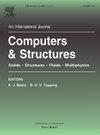贝叶斯模型的凝聚与主自由度的选择
IF 4.8
2区 工程技术
Q1 COMPUTER SCIENCE, INTERDISCIPLINARY APPLICATIONS
引用次数: 0
摘要
大尺度有限元模型在保持较高预测精度的前提下进行缩合是高效结构分析与设计的关键。为此,本文提出了一种新的贝叶斯模型凝聚和主自由度选择框架。其主要思想是将模型凝聚问题转化为贝叶斯全场重构问题。其中关键在于定义响应协方差矩阵,通过条件高斯分布分析得到模型凝聚的变换矩阵。选择合适的响应协方差矩阵后,该方法可以与传统的静态/动态凝聚或Schur互补方案相吻合。此外,由于响应协方差取决于负载,因此所开发的方法可以通过利用负载位置和谱特性的先验信息来简化模型凝聚,最终在保持准确性的同时减少计算开销。另一方面,在贝叶斯框架内,有效地选择主自由度,迭代地包含后验协方差最大的从自由度,从而使预测协方差最小化,并激发启发式自动确定主自由度的数量。通过静态/动态情况下的数值算例,并与几种现有方法进行了比较,以突出贝叶斯模型凝聚和主自由度选择方法的性能。本文章由计算机程序翻译,如有差异,请以英文原文为准。
Bayesian model condensation and selection of master degrees of freedom
Condensation of large-scale finite element models while maintaining high prediction accuracy is crucial for efficient structural analysis and design. To this end, a novel Bayesian framework for model condensation and selection of master degrees of freedom (DOFs) is developed in this paper. The main idea behind it is to recast model condensation into the Bayesian full-field reconstruction problem. In doing so, the key lies in the definition of the response covariance matrix so that the transformation matrix for model condensation is obtained through the conditional Gaussian distribution analysis. It is also shown that this approach can coincide with the conventional static/dynamic condensation or Schur complement schemes after choosing proper response covariance matrices. Moreover, since the response covariance depends on the load, the developed approach can streamline model condensation by leveraging prior information on load locations and spectral properties, ultimately reducing the computational overhead while preserving accuracy. On the other hand, within the Bayesian framework, the master DOFs are efficiently selected to iteratively encompass the slave ones with maximum posterior covariance, and this leads to minimizing the prediction covariance as well as motivating the heuristic automatic determination of the number of master DOFs. Numerical examples on static/dynamic cases and with comparisons to several existing methods are investigated to highlight the performance of the Bayesian model condensation and master DOFs selection approach.
求助全文
通过发布文献求助,成功后即可免费获取论文全文。
去求助
来源期刊

Computers & Structures
工程技术-工程:土木
CiteScore
8.80
自引率
6.40%
发文量
122
审稿时长
33 days
期刊介绍:
Computers & Structures publishes advances in the development and use of computational methods for the solution of problems in engineering and the sciences. The range of appropriate contributions is wide, and includes papers on establishing appropriate mathematical models and their numerical solution in all areas of mechanics. The journal also includes articles that present a substantial review of a field in the topics of the journal.
 求助内容:
求助内容: 应助结果提醒方式:
应助结果提醒方式:


